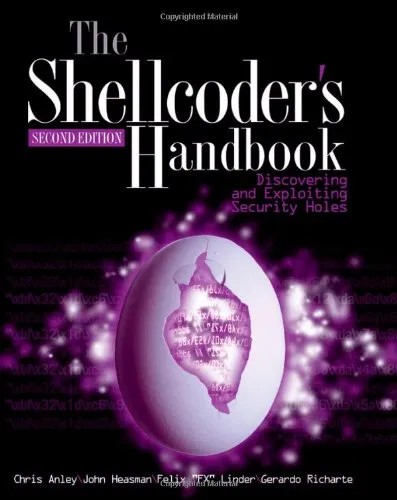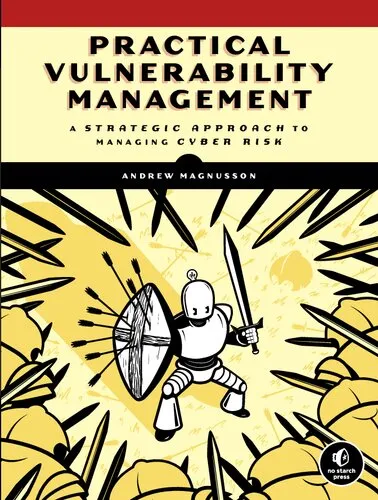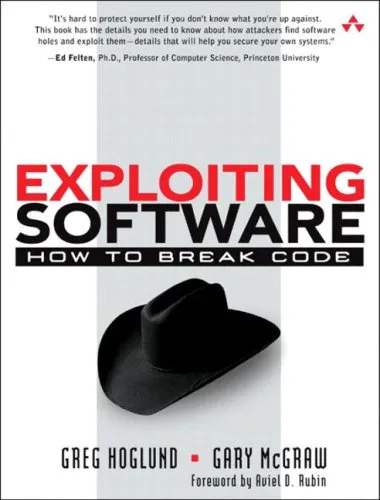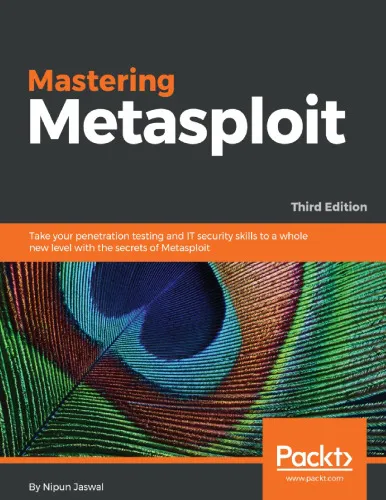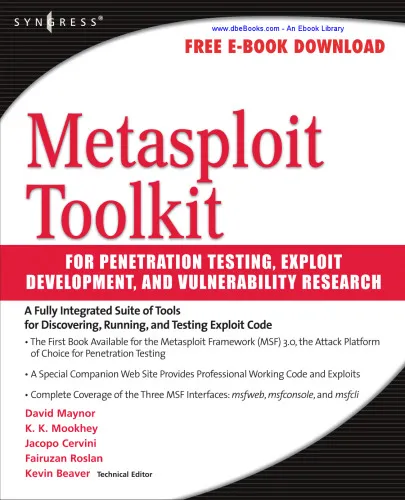The Shellcoder's Handbook: Discovering and Exploiting Security Holes
4.5
Reviews from our users

You Can Ask your questions from this book's AI after Login
Each download or ask from book AI costs 2 points. To earn more free points, please visit the Points Guide Page and complete some valuable actions.Related Refrences:
Introduction to 'The Shellcoder's Handbook: Discovering and Exploiting Security Holes'
‘The Shellcoder's Handbook: Discovering and Exploiting Security Holes’ is a definitive guide to the art and science of crafting exploits and uncovering vulnerabilities in software systems. Authored by Chris Anley, John Heasman, Felix Lindner, and Gerardo Richarte, this book provides an unparalleled deep dive into the techniques and methodologies used by security practitioners to identify, understand, and weaponize programming flaws.
With its pragmatic approach and broad coverage of topics ranging from basic programming errors to sophisticated attack vectors, the book caters to both beginners looking to understand the fundamental concepts of shellcoding and seasoned professionals seeking to refine their skills. It challenges readers to think like an attacker while offering valuable insights into writing secure code to defend against these very threats.
Detailed Summary of the Book
The book is structured into chapters that address various aspects of vulnerability discovery and exploit development. It begins by introducing technical concepts, such as stack overflows, heap management, and the inner workings of modern operating systems, ensuring that readers grasp the underlying principles of exploit development. Progressing methodically, the authors guide readers through the intricacies of writing shellcode, a critical component of constructing functional exploits.
One of the book's key strengths is its explanation of platform-specific techniques, with in-depth discussions covering Windows, Unix, Linux, and embedded systems. These platforms are broken down across various architectures, including x86, x64, ARM, and others, ensuring comprehensive coverage for professionals tackling diverse technological environments. Furthermore, the authors address modern countermeasures like DEP, ASLR, and stack canaries, providing techniques to bypass them effectively.
Delving into advanced concepts, the book explores fuzzing for automation of vulnerability discovery, reverse engineering to understand binary structures, and even the ethical implications of exploit development. Along the way, readers are equipped with practical tips, real-world examples, and code snippets that illustrate the principles covered in each chapter.
Key Takeaways
- Understanding the principles and techniques of exploit development from the ground up.
- Mastering the art of shellcode creation tailored to various platforms and architectures.
- Learning how modern defensive measures like DEP, ASLR, and stack canaries work and how attackers bypass them.
- Gaining insights into automated vulnerability discovery processes using fuzzing.
- Building an ethical perspective on the responsibilities of exploit developers and security professionals.
Famous Quotes from the Book
"A good shellcoder is not someone who memorizes recipes. A good shellcoder is someone who understands recipes, takes them apart, and builds them better."
"To discover security holes, you must think like an attacker. In fact, you must think like a very clever and persistent attacker."
"What makes exploit development an art is not the bug; it's the skill and creativity involved in turning a crash into a controllable situation."
Why This Book Matters
‘The Shellcoder's Handbook’ holds a pivotal place in the information security world, owing to its comprehensive approach to one of the most technically challenging domains: exploit development. Unlike many books that merely scratch the surface, this book empowers its readers with the knowledge needed to understand not only how exploits work but why they work. In doing so, it has become a go-to resource for penetration testers, security researchers, software developers, and even academics seeking a deeper understanding of computer security.
What truly sets this book apart is the balance it strikes between theory and hands-on practice. By providing just enough theoretical grounding alongside real-world examples, it equips security professionals to stay ahead of adversaries by understanding how attackers exploit vulnerabilities. Additionally, the book emphasizes ethical behavior and responsible disclosure, reinforcing the importance of using technical skills constructively.
Ultimately, ‘The Shellcoder's Handbook’ continues to resonate with readers because of its timeless content, even in an era of rapidly evolving technology. Its focus on the core principles of secure programming, coupled with actionable techniques for finding and fixing vulnerabilities, makes it an essential addition to every technical bookshelf.
Free Direct Download
You Can Download this book after Login
Accessing books through legal platforms and public libraries not only supports the rights of authors and publishers but also contributes to the sustainability of reading culture. Before downloading, please take a moment to consider these options.
Find this book on other platforms:
WorldCat helps you find books in libraries worldwide.
See ratings, reviews, and discussions on Goodreads.
Find and buy rare or used books on AbeBooks.
1333
بازدید4.5
امتیاز0
نظر98%
رضایتReviews:
4.5
Based on 0 users review
Questions & Answers
Ask questions about this book or help others by answering
No questions yet. Be the first to ask!
